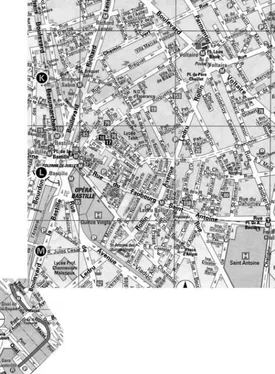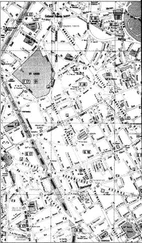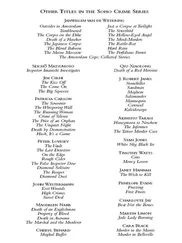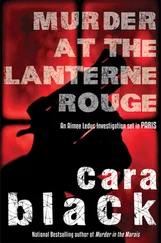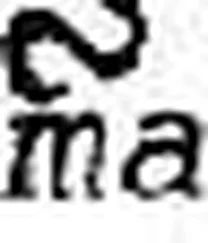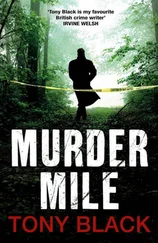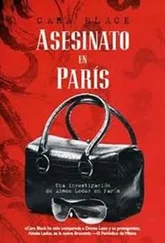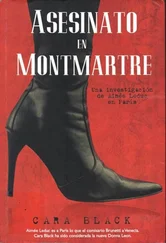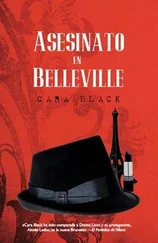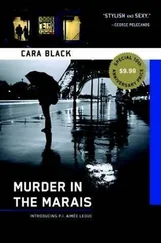“I have Josiane’s phone,” she told him.
If he was surprised his voice didn’t show it. “That’s evidence. Why haven’t you turned it over? ” he said. “ Give me a good reason not to nab you for witholding evidence.”
“A cheap phone with a phone card?” she said. “The only numbers on her speed dial are an architect, her astrologer, and a doctor at the Nuclear Office in Taverny.”
“Taverny?”
“He’s away. You’d find more in her apartment overlooking Marché d’Aligre.”
“But we didn’t,” said Morbier.
He’d dole out information to her bit by bit. Make her work for it. Like he always did.
In the background, Aimée heard voices. Phones rang. “BRIF,” someone answered.
Her shoulders stiffened. Realization flooded over her. No wonder Morbier moved around. “You’re with the explosives division. Terrorism. You never went to Créteil for a seminar.”
“I can’t say anything, Leduc,” he said, with a big sigh. “Go talk to Bellan. Give him your info.”
Instead of satisfaction at Morbier’s words, her heart sank.
“Look, Morbier—” she said, but he’d hung up.
She shook her head. What was wrong with him?
The phone rang.
“Don’t hang up on me like that . . .”
“But I didn’t,” interrupted Dr. Lambert.
“I’m sorry,” she said, surprised.
“Who would hang up on you?” Was that irritation in Lambert’s voice?
“My godfather’s good at it,” she said. “Look, I know I’m not your patient now, but . . .”
“I referred you because Reyaud’s an excellent retinologist,” Dr. Lambert said. “He can help you more than I’m able to right now.” She heard him take a breath over the phone. “The MRI results weren’t conclusive. Sorry, I know you were anxious about them. Take the medication, then I’m sure Reynaud will suggest another MRI.”
Her hopes were plunged into limbo again. She had better say goodbye: He was in the business of taking care of others.
“Thanks for telling me,” she said. “I won’t take any more of your time.”
“Reyaud’s treating you now,” he said. “I’m not. So this is a social call.”
Right. She’d embarrassed him and he was being polite.
“Dinner . . .” he was saying. “I know you drink. You eat, don’t you?”
“Me?”
Was he asking her out for dinner?
“Try to pick a resto. I’ll call you later,” he said. “After evening rounds, I’ve got a consultation, so it’s hard to predict just when.”
Pause.
“Go ahead,” he said. “Hang up on me. You’ll feel better.”
And she did.
Saturday
LOÏC BELLAN TRUDGED UP the wide steps, arguing into his cell phone. “No one’s there. The boat’s shut. Can’t the examining magistrate speed up the search permit?”
“All in good time, Bellan,” said the flic at the other end. “Keep your phone on.”
Along the quai, at the end of a row of plane trees, stood a small café. Grass carpeted the slope up to boulevard de la Bastille. Bellan took a seat on the terrace, ordered a café. No booze, he promised himself.
And he watched the navy blue péniche . He’d had worse stakeouts than this. The sun beat on his face, a fountain gurgled behind him, and the soft lap of wavelets against the hulls lulled him. The roar of Bastille lay right behind him, but one would never know it.
He’d brought his girls here once. When a very pregnant Marie had a doctor’s appointment and she’d begged him to take the afternoon off. A pang of regret hit him. Why hadn’t he done that more often? He’d taken his girls to the science museum at Porte de Villette, then for a slow canal ride all the way here. They’d loved it. So had he.
“Monsieur, monsieur!”
Bellan blinked his eyes. He must have dozed in the sun. No one was there. Or at the boat.
“Monsieur!”
He looked around. A small boy stood partly behind a tree, pointing to Bellan’s feet, where a soccer ball lay.
“Please throw it, monsieur,” said the boy. “We’ll get in trouble if we bother café patrons but . . .”
Bellan lifted the ball, stood and stretched, then walked over to the tree. Three young boys, the oldest no more than 10 years of age, a little bande from the quartier , eyed him.
“Whose ball?”
“Mine,” said a red-faced, tow-headed boy.
“ Bon, I need some help,” said Bellan, sending the ball over the grass with a fancy kick. “You boys know about the boats, about the people who live on them?”
They stared. The red-faced boy caught the ball.
“Ever see anyone go onto that dark blue péniche ?”
They shook their heads in unison.
“André, Marc, Charles! Lunch!”
Good Catholic names.
“Can’t you boys help me?”
They backed away.
“Ask Bidi, he’s bigger than us. The shop at number 22,” said the red-faced boy.
Then they ran past the trees.
He must be losing his edge. After he paid for the coffee, he walked past the hedge and trees.
Number 22, boulevard de la Bastille was a nineteenth-century apartment building. There was a grocery under a striped awning at street level. Bins of bright green peppers, leeks, zucchini, endive spears, and melons lined the façade. From the doorway, Bellan sniffed the detergent smell of a freshly mopped floor.
“ Attention, monsieur, it’s still a bit wet. May I get something for you?” said a bald older man, wiping his hands on his apron, from behind the cash register.
“Bidi, may I speak with him, please?”
“Of course, he’s in the back,” the man said and smiled. “Bidi!”
Bellan noticed the narrow shop’s crammed shelves. Crammed but neat. Organized. Every available space filled: boxes of pasta, flour, tins of cocoa, vacuum packed coffee, biscuits, chocolate or butter, rice, Nutella, and jars of jam and tomato sauces, boxes of brown sugar, slim flaçons of Provençal olive oil and tarragon vinegar, tins of packed sardines and plastic shrink-wrapped eight-packs of bottled mineral water and Orangina. The small refrigerated section was crowded with milk, yogurt, packaged meat and cheeses: goat, sheep, cow, hard, soft, or semi-soft.
This little miracle of convenience was usually known as the arabe —because corner shops open late and on weekends, were usually run by North Africans. They existed all over Paris.
“Alors ,” said the man. “He gets involved in his work, that boy. Bidi!”
Down the aisle, Bellan saw the back of a young man on his knees, stacking cartons of sea salt. His head bobbed; he wore headphones. Bellan tapped him on the shoulder.
“ Pardon. ”
He turned around and Bellan stiffened in surprise.
A smiling Down syndrome-afflicted boy looked up at him.
“Bidi?”
“Ouai ?” he said .
Bellan caught his disappointment before he blurted something he’d regret. What could he get out of this boy? A big fat nothing.
“I’m sorry, I thought you might help me, but you’re busy,” said Bellan, hoping to make a tactful exit.
“Are you shouting because of my headphones?” Bidi said, his words slow but clear. “I took them off. See.” He pointed to them around his neck. “I can hear you.”
Had he been shouting? Bellan’s next words caught in his throat. “I . . . I . . . some children said you might know something.”
Bidi got to his feet, dusted off his knees. “ Ouai ,” he said, nodding his head. He had oval close-set eyes, a small mouth, and freckles. “They told me. Said you looked like a serious man.”
Bellan felt perspiration beading his brow. Was it that hot? He opened the top button of his shirt.
Читать дальше
